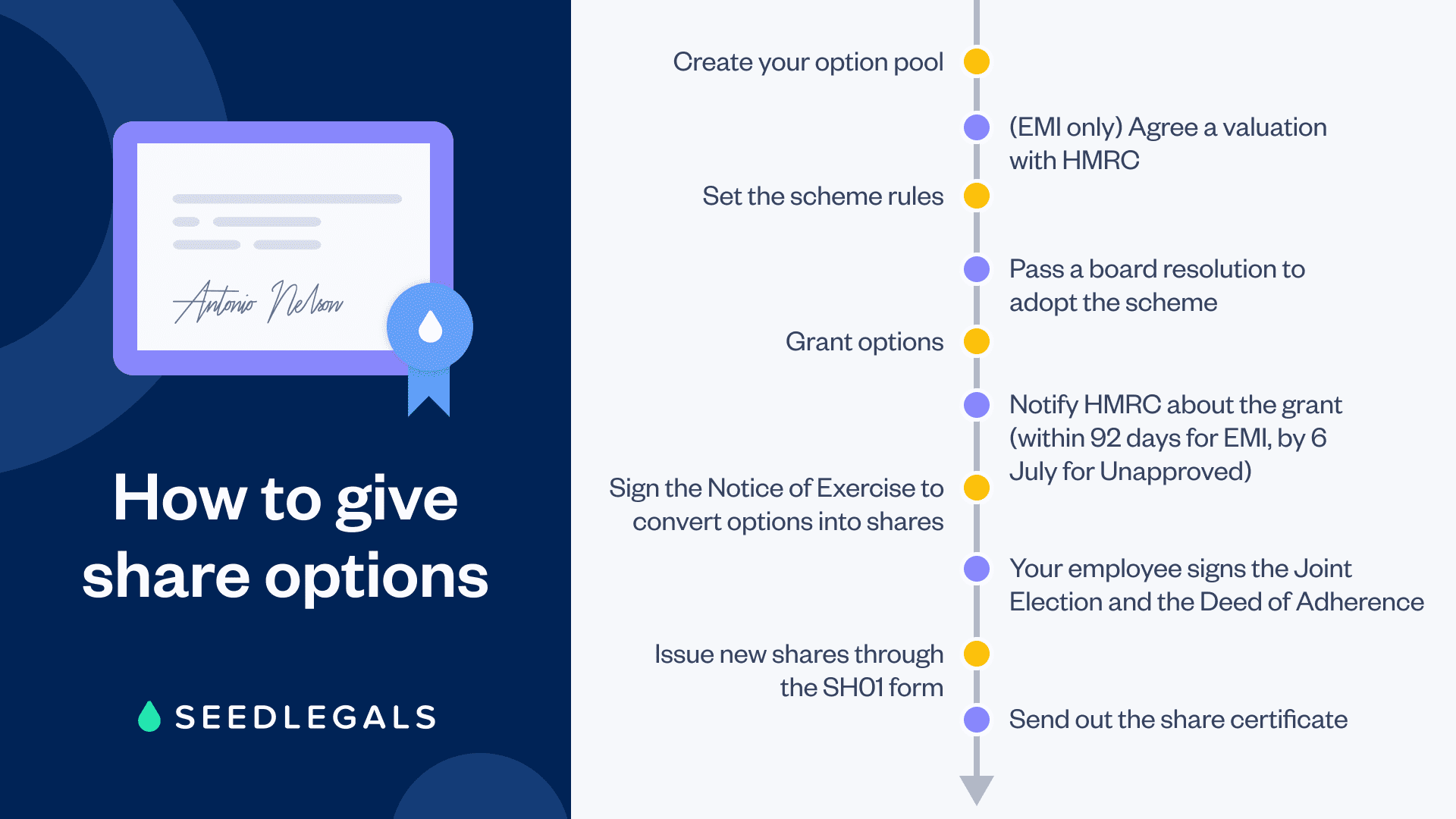Shares vs options: what’s the difference?
The important difference is that if someone owns shares, they are a shareholder immediately. With options, they have own...
For startup founders, company equity is a precious commodity. It needs to be given away sparingly.
Equity is distributed in the form of shares, which are divided between co-founders, used to incentivise early employees and advisors, and exchanged with investors until the company is able to fund its own growth sustainably. Give away too much equity in early stage funding rounds, and you’ll have none left for future investors or employees.
But it’s not just the amount of equity you give away that’s important. The method in which you do it matters too.
In this post, we explain the different considerations in how to give shares to investors and your team, show why share options are often the better choice for employees, and set out the steps involved in issuing both shares and share options.
For investors, it’s simple. You’ll issue shares as specified in the investment agreements you create by doing a full funding round, or by taking in investment quickly through a SeedFAST or Instant Investment.
But for co-founders, employees, advisors, consultants and directors things get trickier. Here, you can choose to give share options instead. Typically you’d only ever give shares to co-founders, and issue share options to employees and advisors.
Here’s why:
When you give someone shares, they become a shareholder immediately. This means (depending on the share class you give them) they’ll instantly have voting rights, the ability to influence key company decisions and even rights to some of the company’s assets in the event it’s shut down.
Adding extra layers of bureaucracy to any company is a breeding ground for inefficiency, and can cause grid-locks if all voting shareholders fail to agree on high level decisions. In a startup, moving fast is mission critical, so shares are typically reserved only for co-founders (and investors when the company raises funding). Everyone else gets share options.
Share options have two major long term benefits for your company.
You can also attach a vesting schedule to shares, as well as share options. The important difference between the two is that shares reverse vest while options forward vest.
Under the forward-vesting schedule, option holders earn options in batches over time. Under the reverse-vesting schedule, shareholders are obliged to sell back unvested shares to the company if they leave before the end of their vesting period.
Completing a share buyback is complex for the business, which is another reason we recommend that employees get options and shares are reserved for founders.
You can find more information about reverse and forward vesting in our vesting explained and founder vesting articles.
Ria Sangal
Options Associate,
Typically early stage startups are pre-revenue and pre-funding, and shares aren’t recognised as having a value in the eyes of HMRC.
However, this changes as soon as you start raising funding or generating substantial revenues. And when your shares have a ‘value’, they are deemed as a taxable benefit by HMRC, so past this point any shares allocated to someone would be subject to immediate taxation, which is far from ideal.
You don’t want to try to remunerate your employees through shares and accidentally land them with a huge tax bill instead.
If you’re still pre-revenue and pre-funding, you can go ahead and issue shares following the process outlined here. But if you fall into any of the three scenarios below, your company will have a value, and share options will be your best bet:
When your company has value, share options are usually a better deal, tax-wise. That’s because there’s generally no tax owed on share options when they are granted, or when they vest. It’s when they are exercised (converted into shares), that they’ll be liable for tax.
Plus, if you issue share options through one of the UK government-approved share option schemes, both you and your employee can reduce your tax liability.
The scheme that’s most relevant to early-stage startups is the Enterprise Management Incentive (EMI) scheme. If you or your employee doesn’t qualify for an approved scheme, you can set up an Unapproved scheme, which gives you more flexibility.
Under the EMI share option scheme, your employees won’t pay Income Tax when they exercise their options at the price agreed with HMRC. They might also benefit from a lower rate of Capital Gains Tax when they sell their shares.
The first thing you need to do is create a share option pool. This ring-fences a percentage of the company equity and gets permission from existing shareholders that a certain number of shares can be allocated as option grants and issued as shares in the future.
On SeedLegals, it’s easy to create an option pool as part of your funding round. Because existing shareholders will already be approving the creation of new shares for the round, you can kill two birds with one stone and get them to approve the option pool at the same time.
Outside of a funding round, you can create or extend an existing pool by passing a Special Resolution with the agreement of 75% of the voting shareholders.
Read more: How to size your option pool
If you’re giving share options under the EMI scheme, you have to agree with HMRC how much the options in your company will be worth. To do this, you’ll submit an EMI Valuation – this is your proposal to HMRC for how much your employees will pay for shares when they exercise their options.
Read more: How to submit your EMI valuation
The major benefit of granting options over shares is the level of control you can
keep over your equity distribution. Share option schemes – both EMI and Unapproved – make it simple to set conditions over the period of time and the
circumstances in which your employees can actually receive their shares.
This protects you from giving away equity to someone who quickly leaves the
company or underperforms and fails to deliver the value you expected.
Vesting conditions control when and how your employee ‘earns’ options. You can parcel out their allocation over several years or set performance targets, for example.
Read more: How to set the right vesting conditions for your option scheme
Exercise conditions control when the options holder can turn their options into real shares. You might only allow options to be exercised when the employee leaves the company, or when the company exits.
Because exercising options means some admin for the company, we recommend you implement an ‘exercise window’. That way you can group all exercising paperwork into a couple of months a year.
Read more: Milestone or exit-only – which option scheme is right for you?




Find out how other startups structure their share option schemes. Our experts share their insights on our data from the thousands of option schemes on SeedLegals.
Get the reportYour board needs to pass a resolution adopting the scheme.
Read more: Board meetings and resolutions – how they work
Enroll the team member onto the scheme. They’ll sign an option agreement, in which you’ve laid out all the vesting and exercise conditions.
If you use SeedLegals to create and manage your share option scheme, it’s quick to get everything set up and signed online. Plus, your employee gets their own dashboard so they can see their allocation, how many options have vested, how much it would cost to exercise and everything else they need to know.
Read more: What employees need to know about share options
If you’ve granted options under the EMI scheme, you need to notify HMRC within 92 days.
If you have granted options under the Unapproved Scheme to UK employees or directors, you only need to submit an annual notification by 6 July each year for the previous financial year’s activity.
When your team member comes to exercise their options, you need to create and share a Notice of Exercise.
When you share this document with your employee, it’s a good time to tell them that they need to transfer money to the company’s bank account in exchange for the shares.
After this document is created and you’ve signed the s431 election to confirm your employee will only pay Income Tax on the shares once, you’ll follow the same process for allocating shares.
Read more: How to exercise share options on SeedLegals
If you’ve decided to allocate new shares (not share options) in your company, you’ll need your existing shareholders to sign a Written Resolution for the Allotment of New Shares. You might also need an Investor Consent notice, depending on what rights your existing shareholders have.
Here are the documents you need to formalise your new shareholder, including those who have just exercised their options:
If that looks like a lot of things to keep track of, don’t worry. With SeedLegals automated workflows, it’s easy to follow the process – and there’s friendly, expert help at every point.




Build and run your option scheme the easy way - all with unlimited support from our 5-star team.
Explore options
Our automated workflow makes it simple to generate all the documents you need to issue shares or share options. But, when you have questions, there’s no substitute for human expertise. We’ve helped thousands of companies set up and manage their share option schemes.
Book a free call with one of our equity specialists. We’re standing by to help you understand the best way to give out shares in your startup.










